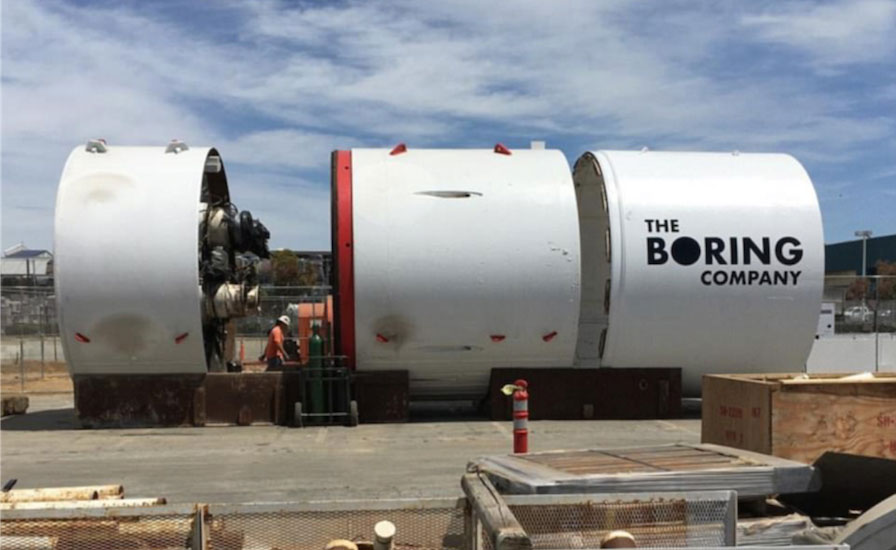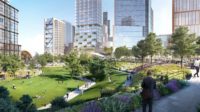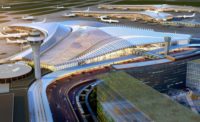Technology guru Elon Musk beat three other construction proposals on June 14 to win the exclusive right to negotiate a design-build-operate-maintain contract with the City of Chicago to provide a high-speed underground passenger transport system between the downtown Loop area and O’Hare Airport. He proposes a one-way trip of about 12 minutes at 150 mph compared with the current 40-minute average by rail or car.
Musk promised that his company, The Boring Co., will pay for 100% of transit system construction, which would feature eight-wheeled “skate” cars built on a modified Tesla Model X chassis. Each car, which has horizontal and vertical wheels, is set to carry up to 16 passengers and luggage on a 16-mile track that would have to cross under the Chicago River at least once.
Musk says he would deliver the link in about three years, citing proprietary technology, smaller-diameter tunnels and better tunnel-boring machines.
A final route for two high-speed tunnels is still being negotiated between The Boring Co. and Chicago. City officials declined to say where it might run but a northwest route, crossing under interstates 90 and 94, over the distance from Block 37 to O’Hare makes the most sense.
Musk, who aims to cover the estimated $1-billion cost from user fees and ads, also projects work to start in “three to four” months, depending on negotiations. He would deliver the link in about three years, citing proprietary technology, smaller-diameter tunnels and better tunnel-boring machines. Musk even promised fares for the Chicago Express Loop would be less than half the cost of a taxi cab or ride-share ride – about $20 to $25 currently - between O’Hare and Block 37, the city-owned parcel where the Chicago Express Loop is planned to end in what’s currently an unfinished Chicago Transit Authority station.
The Boring Co. is already building a test tunnel near sister company Space X’s headquarters in California that could be used as a model for its two Chicago tunnels, but that prototype did not have to pass any of the legal hurdles that a public project would during construction. Even with a DBO-M agreement, Musk will likely have to bring in a contractor with Chicago expertise.
“I suspect a major contractor/construction project management firm will be involved,” said Hani Mahmassani, a Northwestern University engineering expert. “Given the novel technological aspects of the work, Boring Co. couldn't just hand it off to a contractor without integral involvement in the construction details and execution, but it also certainly would not be expected to go it alone.”
A spokesman for Los Angeles indicated that Musk is not working with outside consultants on the project in that city.
Other bidders were Oaktree Capital Management, a private equity firm with undisclosed partners; a team of OHL Infrastructure, Kiewit and Amtrak; and a team of Meridiam, Antarctica Capital, JLC Infrastructure, Mott MacDonald and First Transit. Their proposed costs were not disclosed.
A year ago, the Milwaukee Journal Sentinel reported that Musk had "struck a deal to acquire" a tunnel boring machine from Super Excavators, a tunnel contractor based in Menomonee Falls. "He also drew upon the 67-year-old contracting company’s expertise to get going," the newspaper reported at the time
Peter Schraufnagel, president of Super Excavators, said in response to an ENR inquiry last week that he could not comment.
Expedited Permits Foreseen
Musk cited the ability to negotiate directly with city hall as a reason that the project was so attractive to The Boring Co. and why he believes permitting and construction can be expedited so quickly.
Mahmassanni found Musk's estimate to be low, even with proprietary technology from The Boring Co.
"On the lower end, it would be $600-$800 million per mile, on the upper end close to $2 billion,” he said, also wondering if planned rapid departures could be maintained. Responding to skeptics, Mayor Rahm Emanuel (D) said the line will help the city “write the next chapter in our legacy of innovation and invention" and shot back, citing the legacy of other ambitious Chicago planners.
“Were there doubters when Chicago reversed the flow of the river? Yes. Where are they today?” Emanuel rhetorically asked. “… My view is it’s easy to be a critic or a cynic. What jobs do they produce, what economic growth do they produce?”





Post a comment to this article
Report Abusive Comment